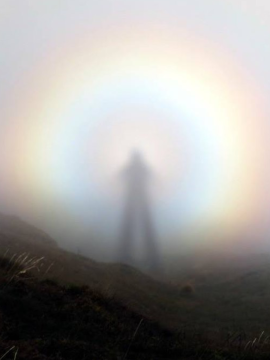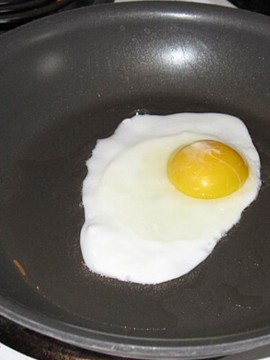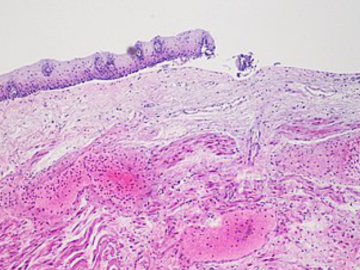Caput Nebula
Bianca Millroy
I
The small, grey room is dimly lit, amplifying the whirr and sigh of the machines.
The examiner hovers; poised as if to give me a scalp massage. It occurs to me how strange the situation is. The dark room. The sentient machines. The heaviness of the wires.
Don’t get too comfortable.
I recall the receptionist’s warning: ‘Patients are known to fall asleep during the procedure.’ I’m in a rigid, man-made mould – it’s hardly the place to curl up.
‘So, what brings you here, Amelia?’ The examiner asks, patiently, routinely.
I wonder if this is his pick-up line.
‘Uh…’ I gesture to the copper discs he is attaching with Clag-like paste.
‘I mean, what are your symptoms?’
His breath on my neck makes me squirm further into the abominable chair.
Slowly, I begin to tell my story.
In the shower. Home, familiar. Late November. A string of hot, sleepless nights.
It starts with a vision. No – rushing thoughts. Abstract images surge into my head like a suspicious download. A daydream I can’t switch off. Suddenly, whoosh. An aircraft cabin losing pressure. I can’t make sense of anything and yet… it’s all happened before. Déjà vu sweeps, wave-like, through my body. I am not in my own skin anymore.
I lose track of time; my surroundings stretch and detach. Cells tingling. Cascading water lulls me into a meditative cocoon. Then, as if I’ve been walloped in the guts, the nausea sets in. Searing pain stretches across my head, temple-to-temple, tightening like a torture device. By this point I am in the corner of the shower. Foetal position. Snatches of sound. Colours blur. Laughter drips from the white-tiled walls.
My partner, Toby, rushes in, asking why I’ve let the water run cold for forty-five minutes. When I don’t reply, he holds me, floppy as an infant, turns off the exhausted taps, and carries me to the quiet enclave of bed. I try to respond, to thank him for taking care of me but my tongue has lost its will. I simply lie there, still and mute, until the blinding, buzzing white noise of it all ceases and morning wipes the slate clean.
I blink myself back to the grey room. ‘These… episodes started ten years ago.’
I wait for the examiner to interject, like doctors usually do at this point.
Oh, panic attacks? Anxiety? Depression? Suicidal ideation? Here, we’ve got a pill for that. Let me write you a prescription…
But he is silent, so I continue.
In the waiting room. Another day, another doctor.
It’s been 72 hours since my last episode. I still can’t form words properly. I have booked a double consultation because I am having a slow day and my case is not your standard bulkbilled fare. But GPs are the medical gatekeepers, so I persevere.
I have come prepared with a list, an inventory of symptoms. The doctor glances at it and returns to his default posture: staring at his computer, humming, keys clacking.
I take this as my cue.
I tell him I couldn’t find my way home yesterday; I’d been banging on the door of the wrong apartment. I tell him I couldn’t recognise my partner’s brother, who I’ve known for years. How trips to the supermarket end in tears because My God! Everything is so damn bright! Lights pulse, colours bleed, and the shape of the world around me warps. How Toby prepared my favourite meal – green Thai curry – but all I could taste was chalky, rotten meat, and in place of bok-choy and brown rice were entrails and writhing maggots….
How, in the midst these turns – in those strange, unfathomable hours; now glimpses through frosted glass – I am repulsed by human touch. And yet these schisms lead me further into myself. Gut instinct wired to neural pathway. Thighbone connected to the knee-bone connected to… I am beginning to trust my body more – and doctors less. Especially this one.
‘So, what’s the problem?’
Still no eye contact. I lose my nerve.
‘The problem is,’ I struggle to keep my voice steady, ‘I need a referral to a specialist to obtain support for—’
He interrupts to point out, humourlessly, that Centrelink is down the road.
‘But—’
‘You can hold down a job just fine – if you count writing a “job”.’
I walk out.
To the grey wall, I say: ‘Sometimes it lasts minutes… sometimes whole hours are gobbled up, and there’s me, oblivious as a garden gnome. Except for a throbbing pain. Here.’ I indicate to the base of my skull and accidentally bump one of the electrodes.
‘Careful.’ The examiner presses the disc firmly, tugging my hair.
His change of manner is palpable: at first a young Frankenstein intent on creating his monster. Now, it’s all cold hands and callous tones.
‘Let’s get you on the bed.’ He positions the hygiene slip and eases a starched pillow beneath my Medusa head. ‘Just… lie… very… still.’
Darkness fills the void, but for an artificial blue glow. My mouth is cotton; all the moisture in my body has fled to my hands. Lying here, wired up like a low-voltage octopus makes me think of dead, bloated things reanimated by electricity, limbs jerking and eye whites rolling. I shiver. Don’t get too comfortable…
A week ago, I’d been slotted inside a giant revolving magnet. The technician had offered to attach a mirrored faceplate. ‘Works wonders for the kiddies,’ she’d assured.
I’d forced the fear down my oesophagus. ‘I’ll just close my eyes, thanks.’
I can do this. Piece of clinical cake.
Trapped in what sounded like a techno-electronic dance party, I relaxed into the thrum of the gargantuan machine, and it became almost… meditative. In fact, when shot out the other end, I expelled a dramatic sigh and, eyes still closed, announced, ‘Damn, how good is it to lie down for an hour without a bra on?’
I’d blinked and seen, not the female technician, but a stunned male radiologist.
The MRI was inconclusive. Further testing required… Medical jargon was thrown around, fusing in my mind like cold spaghetti. I needed to run cold water through this soggy mess to see if I recognised anything of myself in it.
At home, I did what any self-respecting millennial would do: I googled it.
Electroencephalogram.
I rolled it around my tongue, feeling the shape of each syllable.
Uh-lek-trow-en-sef-uh-luh-gram.
I browsed images of EEGs being performed, envisaging something out of the darkest corners of H.P. Lovecraft’s imagination. I scrolled algorithmic questions the Almighty Insentient Google “felt” might be helpful.
EEG – is it painful?
EEG – will it trigger a seizure?
EEG – statistically, how likely is electrocution?
Back in the grey room, I am bathed in a soft glow. Without my glasses, the examiner’s head is a distorted egg. ‘Now, let’s try a little breathing exercise.’
I frown. I don’t recall this in the annals of my Google trawling.
‘Breathe deeply, as fast as you can.’
‘You mean…’ I sit up, forgetting the tentacles gripping my cranium. ‘Hyperventilate?’
A patient, routine nod.
They need real-time measurements to figure out what’s going on inside this oversized walnut. Whatever it takes to get those brainwaves jiving…
I steel myself. Suck air into my throat. Swirl it around my chambers. Expel it like a curse from my lips. I hear myself and want to laugh. I sound like the foot pump Dad uses to inflate our camping beds. Again, in and out. The motion sets off alarm bells. Pins and needles avalanche down my spine. My autonomic system takes over and I slam between one disorientated state and another. Deep down I know I should be paying more attention to the girl flailing in the hospital bed, gulping for air, not knowing when this horror show will end.
I want to scream. I want to spill out of the confines of my malfunctioning body. But I hold the cries under my skin. Only tears make my inner world known.
A gentle voice soothes. Don’t get too comfortable.
A uniformed nurse bursts in, blotchy hands secure a compression band. Cold metal of a stethoscope. Pocket torch shining into my eyes.
‘Slight anisocoria. Heart rate 130. BP 140 over 90. Keep her in for ten.’ The examiner averts his eyes, jaw working. Good.
As the nurse wheels the trolley out, I want to chase after her, but the image of a runaway Frankenstein bride, trailing wires and sparking electrodes, unnerves me.
Surely, I am over the worst. This isn’t the Middle Ages. This isn’t even the 60s where ice-pick lobotomies were still being performed on “hysterical” housewives.
He cranes an apparatus a foot from my face.
‘Close your eyes.’
I settle back on the pillow. Don’t get too—
I grip the bedrail as rapid pulses of light flare. A tremor spreads through my body like wildfire. Open. Dazzling red blooms light up my cortex. Synapses crackle.
Shut. A sour, metallic taste coats my gums.
Open. Blades of light slice at my retinas. I spasm, then capitulate as if the wires connected to my skull are puppet strings controlled by the evil mastermind in the corner.
Shut. I am caught between silent submission and throes of feverish shaking. My brain and body begin to unclasp…
The blinding light ceases.
I bring my scrunched fists to my face, wiping the tears quietly streaming. ‘That’ll do for today,’ comes the disembodied voice, as though determining the quota of discomfort I’m willing to endure. ‘You’re good to go.’
Good to go? I feel like I’ve overstayed my welcome at a face-painting stall.
A clipboard materialises. ‘Sign here.’
The words swim before my eyes. I stare at him, perturbed. Sign for what?
The examiner glances at his watch.
I sigh, and scribble on the dotted line. The form is placed in a tray, piled high. As I slip, wraith-like, out the door, my gaze connects with a wide-eyed woman being shuttled down the corridor. An unspoken solidarity crosses between us.
Don’t get too comfortable.
Outside, the day lies before me like a wasteland.
II
Two weeks later, I get the call.
‘Want me to come?’ Toby offers.
I picture the three of us in the neurologist’s office, poring over graphs and wavelengths, trying to decipher the language of my brain.
‘Um… no, I’m good, thanks.’
He squeezes my hand. ‘Fingers crossed for some answers.’
The clinic is a bland, white box overlooking sprawling parklands. My specialist has a kind smile and too-white teeth. I want to trust him. But I also want him to trust me.
‘So, Amelia, what brings you here today?’
I give a strained smile and hand over a dossier of journal articles and case studies, including a recently published memoir, Hysteria, by Katerina Bryant.
I explain that Katerina is a young Australian woman whose experience is not unlike my own. In fact, the parallels are unnerving.
‘In her book, Katerina explores mental illness in women throughout history. Women who were once diagnosed with “Hysteria” or “Conversion Disorder” known now as FND or “Functional Neurological Disorder”.’
‘You’ve done your research.’ He nods at the diagnosis I am handing him on a manila platter. ‘So, you identify as someone with this condition?’
I hold his gaze for longer than we both feel comfortable.
I’ve read about specialists who ask their patients how they would diagnose themselves. This narrative, dutifully dictated, is checked against notes made by every party privy to the paper trail since the patient first presented X, Y and Z.
These questions, I realise, are a technique.
‘A disorder is not an identity. These episodes are part of me, but I refuse to let them define me. As much as I want them gone, they’re still mine.’
The specialist chuckles. ‘We’re on your side, Amelia; we want to fix this.’
I’d hate to think of his dinner table conversation: Tempura chicken and temporal lobe, anyone? That’s a lot of brains to dissect and understand and fix. But I want urgently for him to see past the skin and tissue and skull, and into my brain.
He passes me a file, which reads: MRI and EEG normal. Diagnosis: The patient has been experiencing a constellation of symptoms correlating to non-epileptic seizures (FND).
Underneath is scrawled: Neurologist? Psychiatrist?
But I am not offered any such referrals. Apparently, FND falls in a “grey” area. Instead, he jots down a website, and then discharges me with a patient, routine smile. So much for specialising in grey matter.
As I walk out, it occurs to me.
I am a physical being, once forged in the nuclear fires of supernovas, and now I have a name for my “constellation”, it feels powerful both inside and outside of me. It is no longer a scattering of symptoms but an entity. I am its person. I have responsibility.
I have response ability.
I breathe deeply, pat my head, and say: ‘Brain, we have work to do, you and I.’
Outside, the day stretches before me like a wonderland.
III
Dear Katerina,
I have been working up the courage to write to you, and finally the moment has arrived. I must let you know how grateful I am for your brave honesty in writing Hysteria.
Hearing of your story, I felt immediately compelled and proceeded to devour your book in two sittings – something I haven’t done for ages – and it resonated with me profoundly. I felt for the first time seen and heard as I learned about your experience (and eventual diagnosis) with FND. This led me to return to my doctor, adamant that I undergo further tests. Following ten years of misdiagnoses, I was advised that I, too, suffer from this debilitating and severely misunderstood condition. I know there is no “cure” or treatment as such, other than to reduce the triggers and look after myself, but I felt it imperative to reach out. I would love to learn more about your own journey. Honestly, I find the best thing is to set my fingers to the keyboard or pen to paper. So that brings me to writing to you!
As a fellow writer, I feel that words are this extraordinary key we have to access and better understand our minds. Inspired to explore the intersection between creativity and neuroscience, I’ve now started my PhD. It’s still early days, and I don’t quite know the shape this project will take, but the first big item on my list was to write to you.
If you have time, (no obligation of course), I’d like to share a short story about my own experience, ‘Caput Nebula’, which is Latin for ‘Head of Fog’.
On a final note, I hope you've found a place where these strange episodes can come and go but your creative soul is kept nurtured. I hope to find that place too but, for the time being, I am grateful this search for answers brought me to your story.
Thank you for the gift that is your book that arrived just in time.
Amelia.


